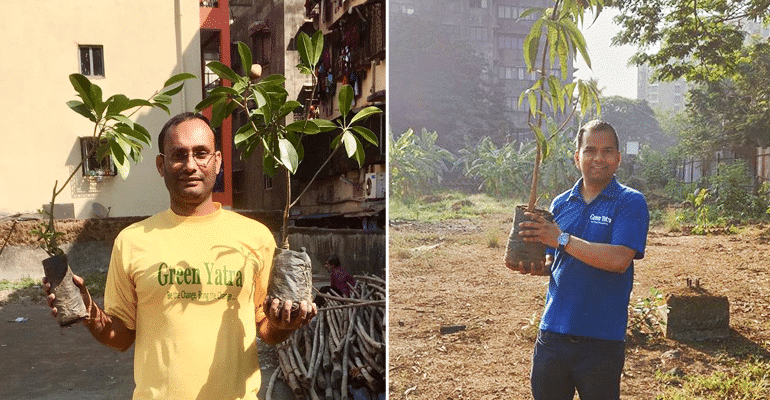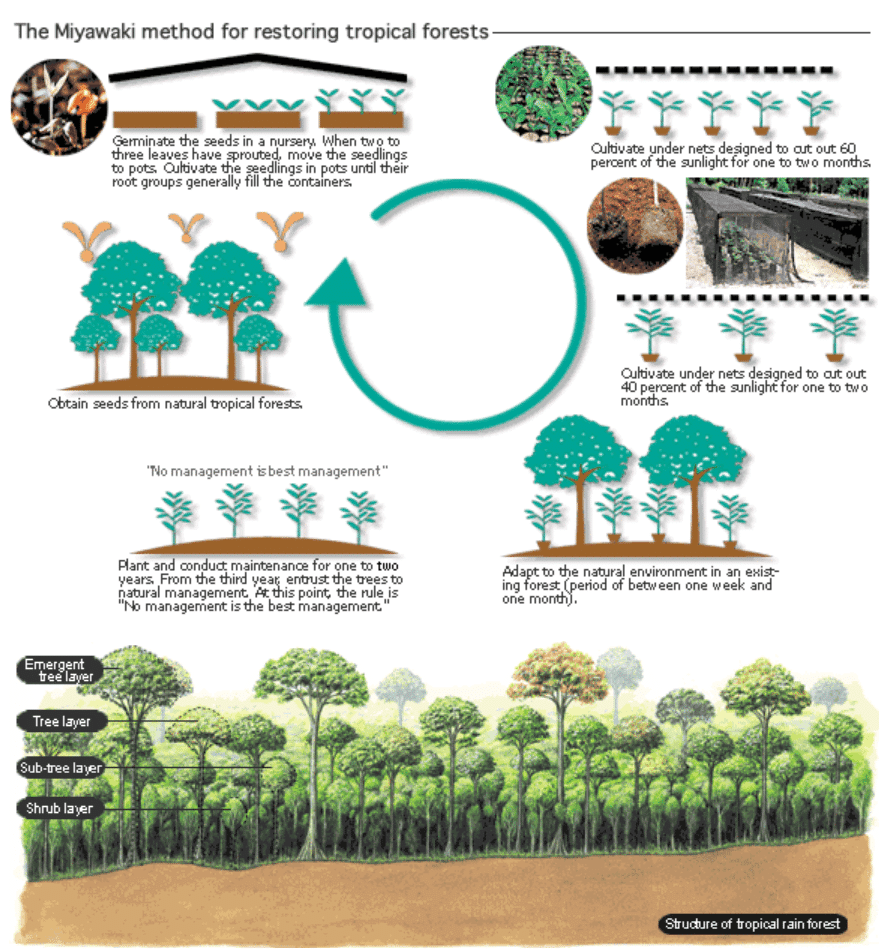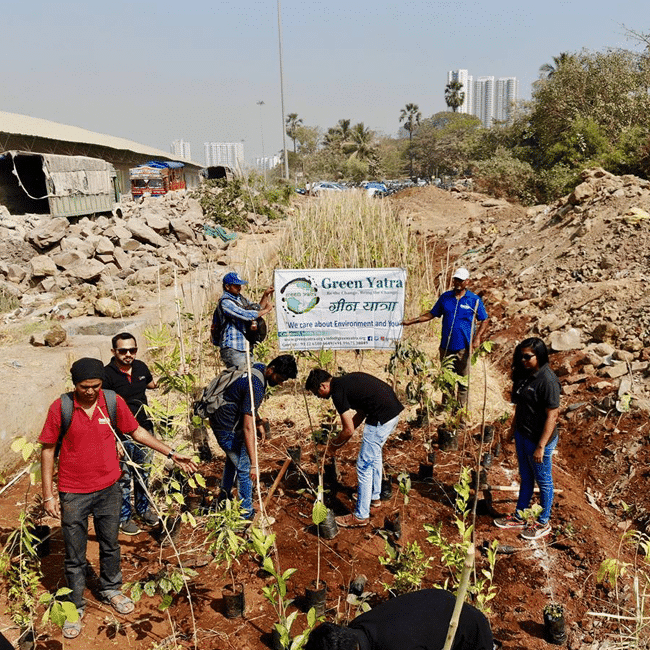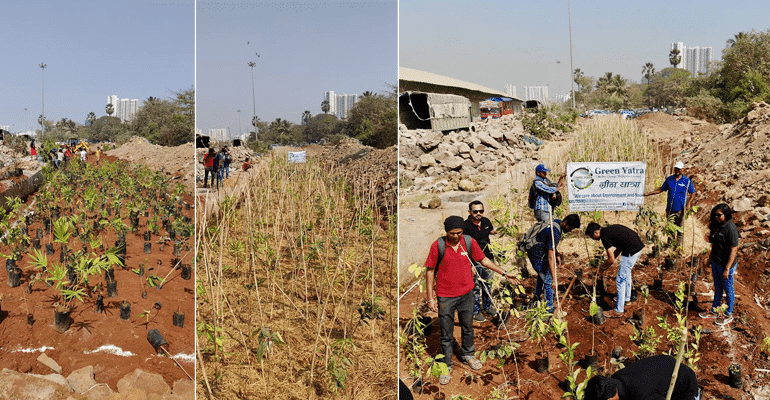Last year this NGO planted over 100,000 trees to increase the green cover of Mumbai and surroundings. This year it aims to plant 1,000,000 trees across India and currently, they are running a campaign #10CroreTreesBy2025 across India.
What’s more interesting? They have created Mumbai’s first big Miyawaki Urban Dense forest, an effective Japanese technique to create a greener world and sustainable earth. Wait, there is more! Soon they are coming up with Pedh Lagao, an online plantation website, and App. Through this app, you will be able to plant a sapling and track its growth from your Smartphone. How cool is that?!
In an exclusive interview, Life Beyond Numbers spoke to Pradeep Tripathi and Durgesh Gupta, founder and co-founder of Green Yatra NGO about what prompted them to start their green journey, online tree plantation initiative, nullifying the environmental damage caused by us and our society at large and how the initiative is empowering rural livelihood in the process.

Born in a small village of Badhera in Satna district of Madhya Pradesh, Pradeep recalls how he grew up surrounded by greenery and beautiful hills. “I always felt close to nature and probably that is one of the reasons for starting this initiative. When I came to Mumbai for higher studies, there was a lot of air pollution in the city and that’s when I realized instead of being part of the problem, I wanted to be a part of the solution. So, I and Durgesh started an initiative to make the earth cleaner and greener,” says Pradeep.
What is Miyawaki Method?
Created by Japanese botanist and plant ecology expert Dr. Akira Miyawaki, this innovative tree plantation technique is basically a unique “Potential Natural Vegetation” concept that can be used worldwide, irrespective of soil and climatic conditions. Till now, more than 3,000 forests have been successfully created worldwide using this methodology.
“In Mumbai, property rate is Rs 20000/sqft so people were not interested to invest time in energy to replenish the green cover of the city. So, we were constantly thinking how in a small space we can create a jungle,” mentions Pradeep.
“While we were experimenting with different techniques, we came across Miyawaki technique, where plants grow 10 times faster, 30 times denser, 100 times more biodiversity, 30 times better Carbon-dioxide absorption, 30 times better noise and dust reduction, 30 times greener surface area, as compared to a monoculture plantation. It requires a minimum of 1000 square feet patch of land to grow a tiny Miyawaki forest. Through this fascinating technique, we get a 100-year-old forest in just 10 years,” he says.

The best part of this method is that you will get a completely maintenance-free, wild, organic, natural and native dense forest in just two years.
“While the traditional method of tree plantation demands a huge piece of land, this Japanese technique is helping us to create a dense forest in a much lesser space. In this method, we plant a minimum 20 – 50 different local and native species plants in a small patch of land. Multi-layered 2-3 feet saplings are planted very closely; 2-5 saplings per square meter. These saplings can grow up to 20 feet grown tree in just 2 years. We do not use any type of chemicals and chemical fertilizers,” says Durgesh.
This dense forest just does not only increase green cover and counters down air pollution, but it also retains more groundwater and recharges the groundwater table and supports local bio-diversity by attracting more birds and insects.
Cutting Trees Will be A Costly Affair?
A report by NGO Delhi Greens claims that the economic value of a healthy tree with respect to its oxygen producing capacity is roughly Rs.23.72 lakh per year.
But, how did they reach this conclusion? Their claim is based on the fact that an average adult at rest inhales 7-8 liters of air per minute which means about 11,000 liters of air per day. Of this, about 20% is Oxygen and nearly 15% is exhaled. “Therefore, a human consumes about 550 liters of pure oxygen per day. Based on a market survey, we found that the average cost of a 2.75-liter portable oxygen cylinder is Rs.6,500. At this rate, a human consumes oxygen worth about Rs.13 lakh per day,” the report said.
“A decade from now, the city will be a sick place to live in and a village will be luxury with all the greenery around,” says Pradeep while expressing his concern for the climate change.

We have only 12 years to cut the risk of extreme heat, drought, floods, and poverty, in short, to counter climate change catastrophe, mentions a UN report.
Creating a Greener World, not Concrete Jungle
It is no secret that the trees help to create a cleaner and greener environment. In the first leg of the project, the NGO has taken a green step by planting 3000 trees of 30+ different native species of plants in Mumbai. They have planted over 12,000 trees in a stretch of about one acre at Central Railside Warehouse Company (CRWC) Ltd. in Jogeshwari East as well. To make tree plantation more effective, their partner organization Say Trees is also providing them with technical expertise.
The founders are planning to make their flagship project #PedhLagao more effective through a mobile app so that you can track the location of the sapling from your smartphone, in case you are not present in person on the plantation day. The location of the sapling will get updated every 3 months so that you can check the growth of the plant.
Apart from this, through Bag for Cause campaign, the team has been appealing housing societies, companies, corporates, schools, colleges to collect and donate their dry waste and E-waste to the cause. In return, they will gift them both low-cost bags for daily needs as grocery and better quality designed canvas, clothes, cotton, tote and jute bags with witty environmental quotes and messages that people can use for shopping, office, college and such other purpose.
“So far we have distributed about 1 lakh cotton bags. It is rural underprivileged women who are making these beautiful items completely out of waste. Therefore, the initiative is empowering the disadvantaged sections of the society as well,” says Pradeep.
Kids should be aware of their environment. They should know about their food and where it comes from. In cities, we go to malls and purchase food realizing the amount of effort and energy invested to grow it. Parents and teachers should teach their children to be thankful for nature always. This will help to make them conscious about nature and create healthy bonding with their surroundings. Through our Green Youth-Green India campaign, we are trying to do the same, he says.
Pradeep tells LBN, “We have conducted free workshops in more than 10,000 schools as to how to go green in everyday life. Why are we cutting the trees, destroying jungles and then spending billions to save the tigers? These are the questions we should be asking children and youths of today. We tell them places where water is a luxury and there are many who do not have this privilege. In many places, girls cannot go to school because to quench their thirst they have to walk several kilometers.”
The NGO’s other projects include Zaroorat-A Need, Child Education Through Raddi, Go Green Kids, Jal, Systematic Waste Management, Green Youth-Green India, Green Societies-Green Earth, Go Green Ganesha.
“Tree plantation is not restricted to any country or religion. So whatever time they can give to their environment, they must work towards reducing pollution. They can start by doing simple things like using public transport often, choosing clothes that require less water when you wash them, using less plastic and using food waste efficiently. To sum up, accept a minimalist lifestyle, it is beneficial for everyone,” Durgesh tells LBN.
Think about the green future and sustainable livelihood. Contribute for yourself, your family and future generation. A contribution that will not only change the fate of your country but humanity overall.


